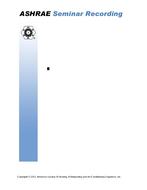Click here to purchase
Future utilities will emphasize home appliances to reduce greenhouse gas emissions while providing electric load shifting and demand profile management. Heat pump water heaters (HPWH) have demonstrated the ability to cut water heating energy by more than 65% compared with conventional electric resistance waters (ERWH). Laboratory research was conducted on the load shifting potential of grid-connected heat pump water heaters (HPWH), compared to ERWHs. Testing applied different CTA-2045 command designs. Highly-controlled laboratory experiments were conducted on one ERWH and four HPWHs, including a prototype incorporating the new CTA-2045-B protocol feature allowing ‘advanced’ load up above the tank setpoint. The prototype unit with the B-protocol increased tank temperature by 15oF (8.3C) under the advanced load up providing an increase of 1.8 kWh of storage for a 50-gallon (189 liter) tank. The prototype includes a built-in mixing valve to meet anti-scalding codes. With the load-shaping ability of CTA-2045-B, utilities might be able to store excess renewable energy in connected tanks when renewable wind and solar resource production is high. Tests were performed under baseline conditions (no load shift) and under several load-shifting schemes, including load up and advanced load up, ahead of shed commands. Grid-connected HPWHs reduced peak demand by as much as 0.5 kW, depending on tank volume, time of day, control scheme, and draw profile.
Product Details
- Published:
- 2022
- Number of Pages:
- 9
- Units of Measure:
- Dual
- File Size:
- 1 file , 1.8 MB
- Product Code(s):
- D-TO-22-C077
- Note:
- This product is unavailable in Russia, Belarus


